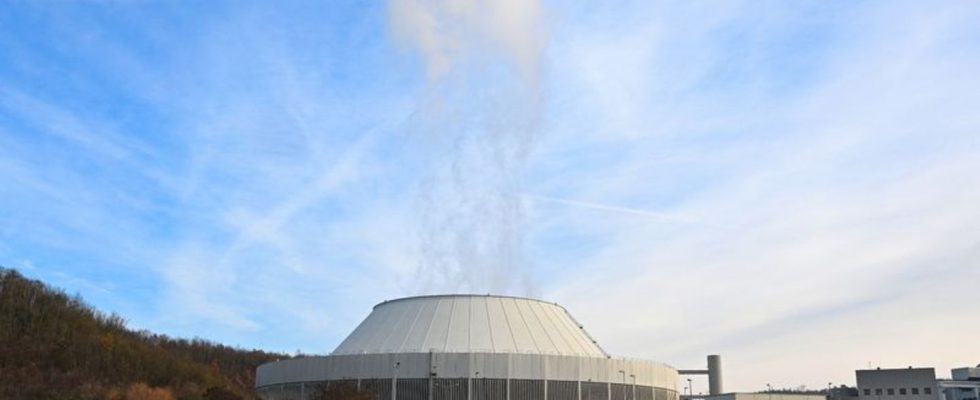Nuclear power end in Germany – last reactors go offline
The Neckarwestheim nuclear power plant. photo
© Bernd Weißbrod/dpa
Today is a historic day for energy policy in Germany – the phase-out of nuclear power comes into force. The nuclear power debate, however, continues to smolder.
Around 62 years ago, the first commercial nuclear power plant in Germany went into operation – on Saturday the three remaining reactors in Germany are to go offline. Even if the age of nuclear power ends in this country, the debate continues to smolder a few hours before the power plants are shut down. While Environment Minister Steffi Lemke (Greens) made her relief about the step clear and opponents of nuclear power in several cities want to celebrate the nuclear phase-out, the FDP describes this as a “strategic mistake”.
Actually, the nuclear power plants should have been taken off the grid at the end of last year. This was decided by the coalition of CDU/CSU and FDP in response to the Fukushima nuclear disaster. However, because of the Russian war of aggression against Ukraine, the traffic light coalition decided last year to let the three reactors continue to run over the winter.
The shutdown of the last plant is expected shortly before midnight – it is unclear which of the Meiler Isar 2 in Bavaria, Emsland in Lower Saxony and Neckarwestheim 2 in Baden-Württemberg will be the last. Operators prepared for the deadline well in advance. The power of the reactors is continuously reduced. The generator is then disconnected from the power grid and the reactor is completely shut down. Nuclear power opponents want to accompany the end in several cities with rallies.
Although the phase-out is imminent, the political debate about continued operation of the pile is not over yet. FDP General Secretary Bijan Djir-Sarai called for this technology not to be completely abandoned. “Nuclear energy must have a future in Germany even after the exit,” he told the German Press Agency in Berlin. “This includes expanding research in the field of nuclear fusion and exploiting the opportunities presented by new and safer nuclear fission technologies.”
If it were up to the FDP chairman Christian Lindner, the three nuclear power plants should be left in reserve and not dismantled. “If we had to bring them online in the next two or three years, we would have this chance,” the finance minister told Welt television on Friday evening. But that failed because of the coalition partner Greens.
The Bavarian Prime Minister Markus Söder said in an interview with the ARD “Tagesthemen” on Friday evening that he believed in a new version of nuclear energy. “We feel this great energy crisis, we need every scrap of energy,” said the CSU politician. ARD broadcast the “Tagesthemen” live from the site of the Isar 2 nuclear power plant in Lower Bavaria. In the 45-minute special edition, moderator Ingo Zamperoni reported on his exclusive visit to the facility.
Hesse’s Prime Minister Boris Rhein called for more research into new technologies. “The Ukraine war and the energy crisis show us that we have to position ourselves broadly. We have to promote research that is open to technology, especially in view of the nuclear phase-out. Not only get out, but also get in,” he told the Frankfurter Allgemeine Zeitung.
Federal Environment Minister Steffi Lemke (Greens), on the other hand, is relieved to see the upcoming end of nuclear energy. “The nuclear phase-out makes Germany safer,” said the Green politician of the German Press Agency. “The risks of nuclear power are ultimately unmanageable in the event of an accident.”
Former Federal Environment Minister Jürgen Trittin (Greens) told the editorial network Germany (RND/Saturday) that if the nuclear power plants continued to operate, there was a risk of becoming dependent on Russia again. The FDP must answer the question of whether they “then want to get the uranium back from Russia”. “We just freed ourselves from our dependency on gas. I don’t want to begrudge Putin this deal,” said Trittin.
With the shutdown of the three reactors, the actual work on phasing out nuclear energy only begins. “We have used nuclear power in our country for about three generations, producing waste that will remain dangerous for 30,000 generations. We are passing this responsibility on to our grandchildren, great-grandchildren and many more generations,” said Lemke, referring to the tasks ahead. In total, more than 30 reactors in Germany still have to be dismantled.

